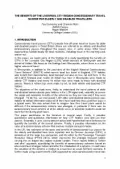-
Past ETC Papers

Browse, search and view papers from the past AET Conferences.
-
Members' Area

AET promotes networking and exchange of ideas, information and opportunities amongst members.
Conference Papers 2016
Barcelona, Spain
ETC Conference Papers 2016
The Benefits of the Liverpool City Region Concessionary Travel Scheme for Elderly and Disabled Travellers
Seminar
Day 3 (7 Oct 2016), Session 7, Pricing/Complexity/Concessionary Travel, 09:00 - 11:00
Status
Accepted, documents submitted
Submitted by / Abstract owner
Fay Dunkerley
Authors
Dr Fay Dunkerley, RAND Europe, Charlene Rohr, RAND Europe, Professor Roger Mackett, UCL
Short abstract
This study aimed to understand the travel patterns of older and disabled concessionary pass holders in the Liverpool City Region, using survey data, and assess the social and economic benefits of the existing schemes.
Abstract
The objectives of this study were to understand the travel patterns of older and disabled concessionary pass holders in the Liverpool City Region (LCR) and to assess the social and economic benefits of the schemes as they are now and if they were changed. Here, we focus on Merseyside, which together with the district of Halton makes up the LCR. Merseyside accounts for much more concessionary travel.
We interviewed 1,001 older and disabled concessionary pass holders to collect information about all of their travel and how they used their pass in a typical week. We also asked them to imagine how their travel plans would be different if the concessionary scheme was changed, in particular if there was no concessionary travel scheme at all. The data collected in the survey were used to quantify the benefits of the overall scheme.
In calculating the benefits of the scheme, we considered benefits to:
- Concessionary pass holders themselves, through money saved on fares, greater access to amenities, services and activities and better health from walking and cycling to bus stops and railway stations
- All public transport users, as a result of improved bus and rail services because of the increased demand for services by concessionary pass holders
- Other road users, as a result of reductions in congestion and accidents because of reduced car use
- The environment, as a result of reductions in noise and greenhouse gas emissions, improvements in local air quality because of reduced car use
- Local retailers, because concessionary pass holders have more disposable income to spend on shopping and leisure
- Wider economic benefits, Better bus and rail services, which improve access to employment and benefit the local economy
We found that over three-quarters of respondents used their travel pass at least one or two days a week to make bus journeys. Disabled pass holders used their pass more frequently (79 per cent) than those with older people’s passes (76 per cent). About a quarter of Merseyside residents on the scheme used their concessionary pass for rail travel at least one or two days a week.
Nearly half of all trips made by older pass holders were made by public transport (43 per cent by bus and around 5 per cent by train), with concessionary passes being used for over 95 per cent of those journeys. Disabled pass holders used public transport even more, with nearly all journeys by disabled pass holders made using their concessionary pass (98 per cent).
Nearly half of the journeys made by older pass holders (40 per cent) were for shopping purposes. In addition 17 per cent of trips were for visiting friends and relatives and another 17 per cent for leisure. These findings are consistent with National Travel Survey data for the northwest region. For disabled pass holders, 35 per cent of journeys were for shopping, 20 per cent for visiting friends and relatives and 11 per cent for other leisure purposes. Journeys for medical purposes were also quite important, reflecting 16 per cent of all journeys made by disabled pass holders. Older pass holders who made shopping or leisure trips were observed to spend an average of £29.50, excluding travel costs, per trip. The average expenditure for disabled pass holders was £26.76. These figures are consistent with other published sources.
As part of the survey, older pass holders were asked to imagine how their travel in the previous week might have changed if they didn’t have a travel pass. This had a substantial impact on their reported bus and rail use. Merseyside pass holders reported that 37 per cent of the bus trips and 46 per cent of the rail trips made in the previous week would not have been made had they no concessionary pass. It might be expected that respondents would overstate the impact of changes to the concessionary travel scheme on their travel behaviour, and this may be exacerbated when these changes are weighted to reflect annual figures. However, when comparing the benefits of the Merseyside scheme with other published figures that used travel changes based on before and after observations, the benefits (specifically the traveller benefits) were reassuringly similar.
The survey also explored linkages between having a concessionary pass and quality of life, where we found that 92 per cent of respondents agreeing or strongly agreeing that having a concessionary pass improved their quality of life; there were high levels of consistency across all pass holders, regardless of age or gender.
Documents:

Association For
European Transport
Forester House
Doctors Lane
Henley-in-Arden
Warwickshire, UK
B95 5AW
+44 (0) 15 64 793552
VAT number: 710 1866 64
Conference Supporters & Endorsers




Legal Entity
The Association for European Transport is registered as an Association ('vereniging') with the Chamber of Commerce for Haaglanden in The Netherlands under company number 27170096.
Built on Zenario




